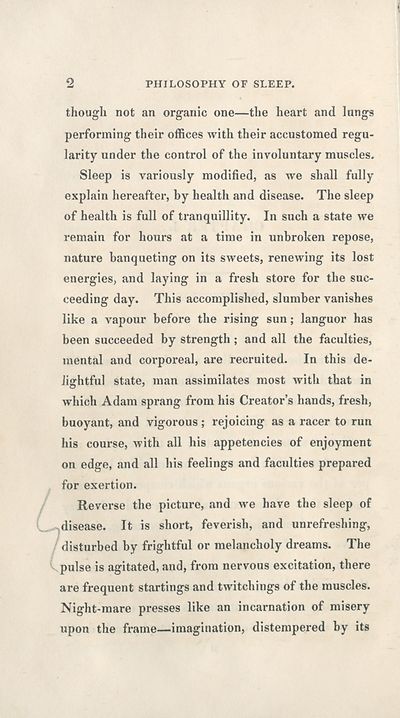Diseases > Philosophy of sleep
(21)
Download files
Complete book:
Individual page:
Thumbnail gallery: Grid view | List view

PHILOSOPHY OF SLEEP.
though not an organic one—the heart and lungs
performing their offices with their accustomed regu¬
larity under the control of the involuntary muscles.
Sleep is variously modified, as we shall fully
explain hereafter, by health and disease. The sleep
of health is full of tranquillity. In such a state we
remain for hours at a time in unbroken repose,
nature banqueting on its sweets, renewing its lost
energies, and laying in a fresh store for the suc¬
ceeding day. This accomplished, slumber vanishes
like a vapour before the rising sun; languor has
been succeeded by strength; and all the faculties,
mental and corporeal, are recruited. In this de¬
lightful state, man assimilates most with that in
which Adam sprang from his Creator’s hands, fresh,
buoyant, and vigorous ; rejoicing as a racer to run
his course, with all his appetencies of enjoyment
on edge, and all his feelings and faculties prepared
for exertion.
Reverse the picture, and we have the sleep of
disease. It is short, feverish, and unrefreshing,
disturbed by frightful or melancholy dreams. The
pulse is agitated, and, from nervous excitation, there
are frequent startings and twitchings of the muscles.
Night-mare presses like an incarnation of misery
upon the frame—imagination, distempered by its
though not an organic one—the heart and lungs
performing their offices with their accustomed regu¬
larity under the control of the involuntary muscles.
Sleep is variously modified, as we shall fully
explain hereafter, by health and disease. The sleep
of health is full of tranquillity. In such a state we
remain for hours at a time in unbroken repose,
nature banqueting on its sweets, renewing its lost
energies, and laying in a fresh store for the suc¬
ceeding day. This accomplished, slumber vanishes
like a vapour before the rising sun; languor has
been succeeded by strength; and all the faculties,
mental and corporeal, are recruited. In this de¬
lightful state, man assimilates most with that in
which Adam sprang from his Creator’s hands, fresh,
buoyant, and vigorous ; rejoicing as a racer to run
his course, with all his appetencies of enjoyment
on edge, and all his feelings and faculties prepared
for exertion.
Reverse the picture, and we have the sleep of
disease. It is short, feverish, and unrefreshing,
disturbed by frightful or melancholy dreams. The
pulse is agitated, and, from nervous excitation, there
are frequent startings and twitchings of the muscles.
Night-mare presses like an incarnation of misery
upon the frame—imagination, distempered by its
Set display mode to:
![]() Universal Viewer |
Universal Viewer | ![]() Mirador |
Large image | Transcription
Mirador |
Large image | Transcription
| Antiquarian books of Scotland > Diseases > Philosophy of sleep > (21) |
|---|
| Permanent URL | https://digital.nls.uk/118856588 |
|---|
| Description | Thousands of printed books from the Antiquarian Books of Scotland collection which dates from 1641 to the 1980s. The collection consists of 14,800 books which were published in Scotland or have a Scottish connection, e.g. through the author, printer or owner. Subjects covered include sport, education, diseases, adventure, occupations, Jacobites, politics and religion. Among the 29 languages represented are English, Gaelic, Italian, French, Russian and Swedish. |
|---|

